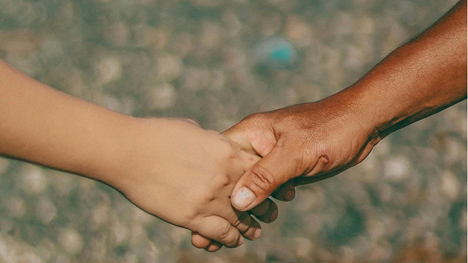Modern Friendships and Good Company: Foundations and Principles

It is easier to read and write about the truths of friendship than to practice them. This is because of two reasons: first, humans are imperfect, and second, friendship is an imperfect good. Since a perfect good is self-sufficient, complete, fulfilling in every way, and leading to no further desire or deficiency, friendship does not satisfy the soul’s deepest longing, which is for God alone. The beautiful thing, however, is that it can lead to it. My interest in the subject of friendship has grown gradually as I have gotten older. I have decided to explore, or to put it more correctly, re-explore (on the back of scholars who have done the heavy lifting on the fundamentals), modern friendships Thomistically because of their primary and continuing existential importance.
It is a common saying that it is a reluctance to extend hospitality that makes one say, “My friend’s friend has arrived”; one should simply say, “My friend has arrived.” I imagine such double-talk could be due to confusion as to who to call a friend nowadays. We now live in an era of plurality of wills and competing visions, an era of significant sociocultural and technological changes, and it has never been more important to find people with whom one can have a God-aligned and visionary union of wills. In all its parts, this essay is dedicated to everyone trying to find true friendship while their soul longs for God. I am trying to do the same, and what an experience it has been! This essay will boldly ignore the evolutionary, biological, and empirical foundations of friendship and focus on the systematic, philosophical, and theological aspects of this imperfect good. I should be grateful if the reader, through it, could learn, unlearn, and relearn some truths about modern friendships — or meet any combination of these goals.
There is the story of two friends who, when the time came for their friendship to end, one asked the other why things had to be so. John and James had been friends since childhood, bound by years of shared memories, pleasure, and quid pro pros. They had met as boys playing football on sandy fields, and over time, their bond deepened through the struggles of growing up as second-class citizens in a world that often felt too uncertain.
But as they grew older, something began to shift.
John was ambitious and disciplined, focused on building a stable future. He wanted a structured life — one with clear-enough career goals, financial security, and most importantly, a steady path towards marriage and family.
James, on the other hand, wanted freedom and spontaneity. He changed jobs frequently, lived for the moment, and resisted any idea of settling down. To him, life was about exploration, trying new things, and refusing to be tied down by expectations. The idea of being locked into a career path or committing to one person or place felt suffocating.
For years, they tried to ignore these differences. Their friendship had survived disagreements before — why should this be any different? But slowly, and as they got older, cracks began to form. Decisions that once felt mutual now felt like battles. Conversations turned into arguments. What once united them — their passion, their ambition — now only highlighted the widening gap between them.
One evening, after another exhausting debate over the phone, John said, “How can we walk together when we no longer agree on where we’re going? Can two walk together except they agree?”
James sighed, the weight of unspoken words pressing on his chest. “Maybe we were never meant to walk the same road forever.”
And just like that, they knew.
There was no great betrayal, no dramatic falling-out — only the quiet, painful realization that without a union of wills towards a common goal, even the strongest friendships will drift apart.
The next time they met, they were polite, even warm. But the fire was gone, replaced by a respectful distance. The discord was clear; their roads had diverged, and neither would turn back.
It was Aristotle who first itemized the three kinds of friendship: friendship for pleasure, that for utility, and perfect friendship (even though friendship itself is an imperfect phenomenon). Those who love for utility do so because of what is good for themselves, and those who love for pleasure because of what is pleasant for themselves. Friendships of older people generally tend towards utility, and friendships of younger people generally tend towards pleasure. The problem with these kinds of friendships is that what is useful and what is pleasant is always changing. Perfect friendship, according to the ancient philosopher, is that of people who are alike in virtue. Such persons wish their friends well for their friends’ sake, and expectedly, such friendships are infrequent. Of friendships made with a view to pleasure, few are enough. Of friendships made with a view to utility, one could naturally not make more than a few because it is difficult to be useful to many people in return for what is essentially a short lifetime. But of good friends, one should have as many as possible. Can these three types of friendships be found in one person, whereby the same individual satisfies the need for pleasure, is useful, and is alike in virtues, wishing us well for our sakes? Again, that is rare. The sharing of a common goal is not central to Aristotle’s definition of friendship. Friendship is important because we need friends in adversity and in good times — in bad times, to share our grief with us, and in good times, to have someone to benefit and delight. Through friends, we expand the capacity to perform virtuous deeds.
When I was younger, I made friends with people because we shared the same neighborhood; was friends with people who attended the same primary and secondary schools as me; was friends with people because my parents were friends with their parents; was friends with people because we played video games together; was friends with people because we had mutual friends. These were all bonds of mutual affection. Either one or multiple combinations of those things tied us together. When the teacher asked us to write a composition about our best friend, the decision was often an emotional lottery. That exercise was often memorable because of the confusion and quarrels that would begin in the aftermath, for it frequently happened that the best friend that a pupil wrote about did not write about them in return. These early, necessary friendships were innocently based on shared activities, choices, and feelings.
What is the relationship between self-discovery and friendship? When is a person adequately positioned to make true friends? The ability to make true friends is not a question of age. It’s rather a question of being able to answer a few questions such as: Who am I? Where am I from? Why am I here? What can I do? And where am I going? When one knows the answers to these questions, one can be true friends with oneself and then be ready to make friends with others, hence the relationship between self-discovery and friendship. It is possible for a relationship that did not start as intentional to develop dynamically into true friendship when all parties commit to self-discovery.
Who, then, are true friends? Friends are those who share a union of wills, not just a union of opinions, towards a common goal; and concord, in which one’s choice of action is the same or closely related to that of a friend, is a key requirement for friendship. It is the child who lifts its arms that one picks up and dances with. In talking about the human will, it is necessary to discuss the trichotomy of human nature. Man is a spirit that has a soul and lives in a body. The body is the physical vessel that interacts with the physical world using the senses. The soul comprises the mind, will, and emotions. The mind/intellect is responsible for reasoning, thinking, and understanding; the will (which is the center of this discussion) is the faculty of choice and decision-making; and the emotions are the seat of feelings, desires, and passions. The spirit enables God-consciousness and makes possible worship with God. It is the basis of intuition, conscience, and regeneration. Relationships with other entities are possible because man can create a relationship with himself, and he is conscious of that. Man can be friends with others because he can be friends with himself. Friendship is based on self-love, and the love that binds friends is a love that involves choices made possible by their will. Friends are bound to wish the ultimate good for their friends — union with God. In friendship, it helps to love than to wish to be loved.
There are two requirements for true friendship:
1. A union of wills geared toward a God-aligned vision.
2. A love of friendship made possible by choice.
What happened between John and James, put simply, is a separation of wills and the absence of a common goal. Friendship can endure disagreements and even profit from them if such friends have a union of wills with the primary goods (life, virtues, salvation, knowledge and truth, justice, and worship with God). To will the same secondary goods, i.e., those goods used as a means to attain primary goods (e.g., wealth, political power, pleasure), is not a requirement for friendship. In other words, you can will secondary goods with another and not be friends with them. Therefore, a union of wills and the constant incomplete nature of our knowledge leave room for disagreement. Consider this: being friends with God may be a mystery because why He wills what He wills is often unknown to us, and it is not always the appropriate thing to will what He wills, as that can be judged to be morally and even ethically wrong because of our incomplete knowledge or our specific circumstances. For example, God might allow cancer in a husband (to glorify His name), but it would be morally unexplainable for the wife to will the same thing as Him. It is possible to love God perfectly without having a perfect knowledge of Him. Sometimes, in a friendship between humans, a similar thing happens when a person does not understand the reason behind their friend’s will because of incomplete knowledge and circumstances. Conformity of wills to the extent of the knowledge available to us may then become necessary.
One of the things that prevents us from willing the same with others and joining in projects or paths of action with them, outside of those two requirements of friendship, is pride. Pride is, at its core, an inordinate desire for excellence, which one satisfies by setting up and maintaining a false image via delusion. A man is said to be proud when he wishes to appear above what he is. It is an exaggerated desire to stand out by desiring to have something over others, which is proper to have on the same basis as others. Excellence, for a proud person, is defined not because he possesses some abilities but because he possesses them more than others. A proud person also takes faults and defects in other people as a sign of his excellence, which naturally makes him recognize others’ faults more than he recognizes their virtues. Pride prevents us from learning from others and makes it difficult to enjoy greatness that did not originate with us. Because a proud man thinks the truth should, albeit selfishly, confer some type of excellence on him, he is also not able to enjoy the possession of it. A man acts proudly when he does not make his will concord with the will of those who are better than him in a certain domain. If a person refuses to accept the superiority of another regarding a thing, a disunion of wills and a lack of friendship is the result. Also, when a person refuses to unite with another’s will simply because they want to excite sentiments of superiority in observers (whether they do or do not possess the claimed superior abilities), pride is at play. Pride is ultimately contempt for the divine. It may, however, be necessary to stick to one’s will because the will of others is faulty, as it may be necessary to refuse to be subject to the rule of authority if one has determined sufficiently that it is not following the divine rule. Also, when a man reasonably wishes to truly do the genuine work of maximizing the potential of what he already is, that is not pride. It is humanly difficult to always act against pride, but once pride is discovered by reason, it should immediately be avoided. Pride does not become a great sin until the judgment of reason points it out and one still refuses to do something about it. Three things help to counter pride: one’s infirmity, God’s greatness, and the imperfection and perishability of the things on which man prides himself. Pride impedes union or conformity of wills. It manifests in the dismissal of ideas from others, a refusal to execute projects with others because it will reflect badly on some false self-ascribed excellence, and an unwillingness to submit to legitimate law and authority that are per God’s will.
No human knows definitively what another person thinks, and so uncertainty and friendship have much in common. Presumptions, trust, and hope are parts of friendship. We do not have access to others’ wills, nor do we know for certain what they will do in the future. Since friendship is a primary good, and it helps us to acquire other goods, having an idea of other people’s future actions is beneficial. In the absence of contrary evidence, when judgment needs to be made, it helps to assume that your friend will mean and do what they say and that their actions would be consistent with previously observed actions. For different reasons, whether for contempt or envy (sorrow for another’s good), some find it useful to invariably disbelieve others by naturally assuming they will not do what they say unless they see contrary evidence. Friendship, however, requires a presumption of authenticity. It assumes the best of a friend. It also interprets for the best, whatever is doubtful about another person, unless we have an evident indication of their wickedness. Granted, anyone who does these may be deceived more often than not, but it is far better to be wrong frequently by thinking well of a wicked person than to be wrong less frequently by thinking evil of a good man — no harm is done in the former case. This is where trust comes into play in friendship. Friendship also involves a realistic hope that the common goal will be achieved and that the friendship will continue. Friends hope to change each other’s wills by teaching and by rousing emotions. Perfect, disinterested hope, which excludes pride, enables us to think big and search for people willing to cooperate with us to work towards a common end. Hope in friendship also keeps away despair.
Friendship is not free from grudges and disputes, and it gives occasion for the intervention of justice and vice versa. While it is reasonable to endure some harm and a lack of peace in friendship, it may be necessary to recourse to justice when the occasion warrants it. Historically, friends avoided recoursing to justice to avoid confrontation or making things worse. But God himself instituted judicial offices. Consider two friends, Bayo and Tade, who had been inseparable. They had embarked on a business venture together, a moderately successful enterprise intended to uplift the poorest of the poor in their community and honor the legacies of a mutual mentor who had taught them the value of social entrepreneurship. Ambition, however, began to erode the foundation of their bond when Bayo, the chief executive officer, driven either by a desperate need to make excessive profits for himself and their shareholders or by the need to reinvest profits back into the business, diverted funds and reshaped the venture. Tade, the chairman of the board, who had believed in their united purpose, saw this as a fundamental mistake. Their once-shared vision became a battleground of misunderstanding and deep disagreements. After countless debates, unhelpful reconciliations with the help of mediators, and alternative dispute resolutions, they found themselves compelled to let the cold machinery of the judicial system adjudicate the future of their enterprise. After every other means have been tried, recoursing to justice against a friend may be necessary if greed and avarice are ruled out as motivations, the trial is not detrimental to public peace, procedural justice is kept, and moral shock harmful to the society is avoided. In this way, friendship stands a chance of being preserved.
At what point should friends reconcile and restore their friendship? God is the first victim of every wrong, even though He is invulnerable because every wrong in friendship attempts to damage the ultimate, perfect good — union with God. But He is also a friend of the offender. Contrition, confession, and satisfaction (fasting, charitable deeds, and praying) are necessary in the process of restoring friendship. Satisfaction, which need not be on the same level as the gravity of the offense, must come freely from the offender’s accord for the specific wrong(s) done and must be focused on restoring honour to the offended. Being contrite for just one offense and not for other offenses does not work.
Fulfilling the two requirements of friendship makes for good company. Good company is not about being around good, even kind people — one could be around good people and not be in good company. It is instead about vision. Vision originates from purpose. Vision means seeing the end from the beginning, which is consistent with a part of the key requirements of friendship: having a common end goal, and it is for the benefit of others. When two people are aligned with God and with each other in their friendship, their companionship improves rather than corrupt good manners. If friendship passes the criteria of unity of wills and love of friendship but lacks unity of vision (the end goal), it is not true friendship and, therefore, cannot lead to good company. Good company promotes the ultimate good — union with God. At the start of a friendship between two persons, they should be able to see the end from the beginning and work relentlessly towards it. Personal vision is always found in a larger corporate vision, therefore, one’s best friends should be those with whom one has the same corporate vision. For example, Paul mentions Demas as someone who was once a fellow worker in the Bible. Over time, however, Demas abandoned Paul because he “loved the present world” — his priorities shifted away from the higher calling of their shared mission. The separation of wills is evident in the lack of unity in their personal and, hence, corporate visions. Demas would have been bad company for Paul and the believers even though they were good company for him.
This is the same reason why in the case of marriage, we are encouraged to marry our best friend. Provided such friendship is true and fulfills the criteria mentioned, such a couple is expected to be in good company for the rest of their earthly lives. This type of friendship outlives both friends by ensuring that the fruits of such a marriage possess a love of friendship and a union of wills towards a common vision. Nowadays, many relatives are not in the original sense friends, and true friendship is lacking in the fundamental unit of society — the family. There are families comprised of strangers who just happen to know each other well.
We have established the foundations and principles of true friendship and good company. The rest of this essay will discuss the different types, forms, and examples of friendships and the sociocultural and technological factors that have influenced how true friendship is practiced today.



